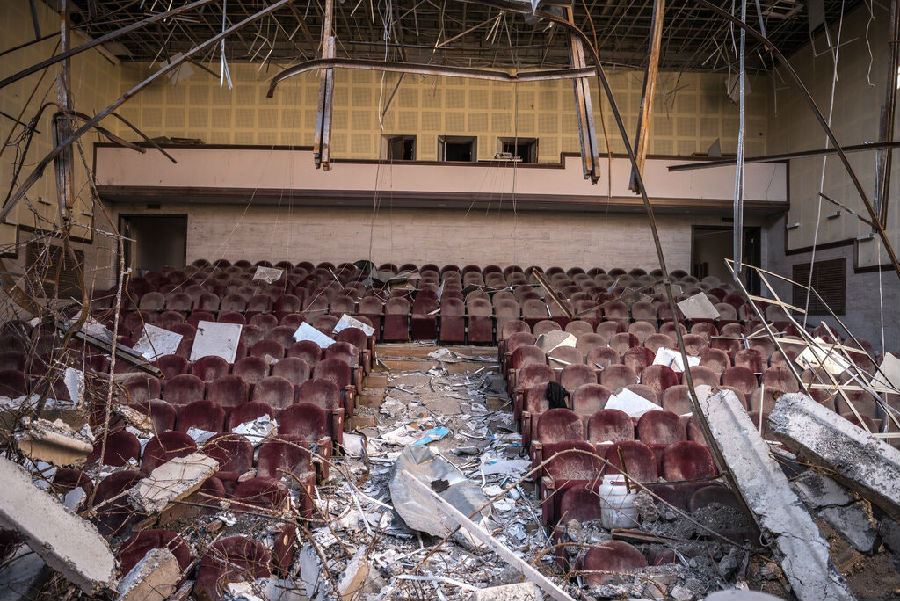"You knock down one guy, and they don't run away," said a soldier back from the front, Tigran Saakyan, dressed in a brown-and-tan knit sweater under his military jacket.
“就算你打倒了一个人,他们也不会逃命,”从前线回来,军装里穿着一件棕褐色针织毛衣的士兵提格兰·萨基安说道。
"You knock down a second guy, you knock down a third guy, and they keep coming anyway — coming like robots."
“你又撂倒了一个,又撂倒了一个,不管你拿他们怎么样,他们都还是会继续冲过来——就像机器人一样。”
At a military base in Stepanakert, Mr. Saakyan and his comrades,
在斯捷潘纳克特的一个军事基地,萨基安和他的战友们——
some of them in their 50s, were waiting to be blessed by military clergy.
有一些已经50多岁了——正在等待接受军方神职人员的赐福。
Narek Petrosyan, a deacon in the Armenian Apostolic Church,
纳雷克·彼得罗相是亚美尼亚使徒教会的一名执事,
said that when soldiers' relatives call him asking for word from the front,
他说,有军属打电话给他询问前线的消息时,
he tries to give them hope, even if he knows that their loved ones have died.
即便他知道他们的亲人其实已经牺牲了,他也会尽力让大家心怀希望。
A separate group of clergy is charged with delivering that news.
另一组神职人员则负责传递士兵阵亡的消息。
"We tell them that this is a holy war, and we are prepared to sacrifice our lives for each other," he said.
“我们对大家说,这是一场圣战,我们已经准备好了为彼此献出自己的生命,”他说。
More than 700 Armenian soldiers have already been killed, along with scores of civilians on both sides.
目前,亚美尼亚方面有700多名士兵牺牲,双方各有数十名平民丧生。
Azerbaijan has not been disclosing its military death toll.
阿塞拜疆一直没有披露他们军方的死亡人数。
But the government said Saturday that 14 civilians were killed in Ganja, Azerbaijan's second-largest city, in an overnight missile attack by Armenia.
不过,其政府周六表示,阿塞拜疆第二大城市甘贾有14名平民在亚美尼亚趁夜发动的导弹袭击中丧生。
Officials say that more than half the people of Nagorno-Karabakh have fled their homes,
当局官员表示,纳戈尔诺-卡拉巴赫半数以上的人都已经逃离家乡,
though the martial law currently in effect bars men of military age from leaving the territory.
尽管目前实行的戒严令禁止满足征兵年龄的男性离开该地区。
Those who stayed behind include women who want to be close to their husbands, sons and fathers sent to the front lines.
留下来的人群中有一部分是希望离被派往前线的丈夫、儿子或父亲更近一些的女性。
The coronavirus is far down the list of people's worries,
相比之下,人们对新冠病毒的担忧反倒很少,
even though international aid organizations warn that cramped bomb shelters are spreading infection.
尽管国际援助组织警告称,感染已经在拥挤的防空洞里传播开来。

Alyona Shakhramanyan, 33, and her neighbors from the fifth floor of an apartment building in Shusha, the hilltop town,
现年33岁的阿莉奥娜·沙克拉曼扬原本住在山顶小镇舒沙一栋公寓楼的五楼,
moved three weeks ago into a section of their dirt-floor basement.
三周前,她和同一楼的邻居一起搬进了地面还是黄土的地下室的一角。
They fashioned a door out of a sheet of corrugated plastic and taped cardboard over the openings in the concrete walls.
她们用一张瓦楞塑料板和用胶带固定的纸箱在混凝土墙上的开口处做了一扇门。
One of the women is sick — a cold, they say, that she caught because of the drafty air.
她们中间有一名姐妹生病了——她们说是因为通风不畅导致的感冒。
Ms. Shakhramanyan's brother, who, like her husband, is at the front, has not been answering his phone.
沙赫拉曼扬的哥哥,和她的丈夫一样都上了前线,一直没有接听他的电话。
When she went outside to do laundry the previous day, she was frightened by the buzz of a drone.
前一天她出门洗衣服时被无人机的嗡嗡声吓坏了。
Rocket artillery hit the nearby Holy Savior Cathedral twice earlier this month,
本月早些时候,火箭炮两次击中了附近的圣救主大教堂,
and the paving stones outside it were still stained with the blood of a Russian journalist critically injured in the second strike.
教堂外的铺路石上现在还有在第二次袭击中受了重伤的俄罗斯记者的鲜血。
"No one helps us here," Ms. Shakhramanyan said.
“没有人来帮我们,”沙赫拉曼扬说。
"We are on our own."
“我们只能靠自己。”
At the military cemetery in Stepanakert, the resting place of fighters who died in the 1990s,
安葬着上世纪90年代阵亡的将士的斯捷潘纳克特烈士陵园里,
the authorities removed a retaining wall and dug into a hillside to make way for the new casualties.
当局拆掉了之前留着的一堵墙,沿着山坡挖起了新的墓穴,为的是安葬新伤亡的士兵。
Amid the artificial-flower wreaths and simple grave sites on the freshly graded, rocky dirt,
在夹杂着石子的墓地新垒起的简单墓园里,在一片用假花制成的花圈中,
a man whose brother was gone spread his arms in grief.
一个兄弟刚刚去世的男子悲痛得摊开着双臂。
"These are fresh — our guys," he cried, his voice trailing off.
“这些都是刚遇难的——都是我们的亲人,”他哭喊着,声音越来越弱。
"What is there to say?"
“我还能说什么呢?”
译文由可可原创,仅供学习交流使用,未经许可请勿转载。














